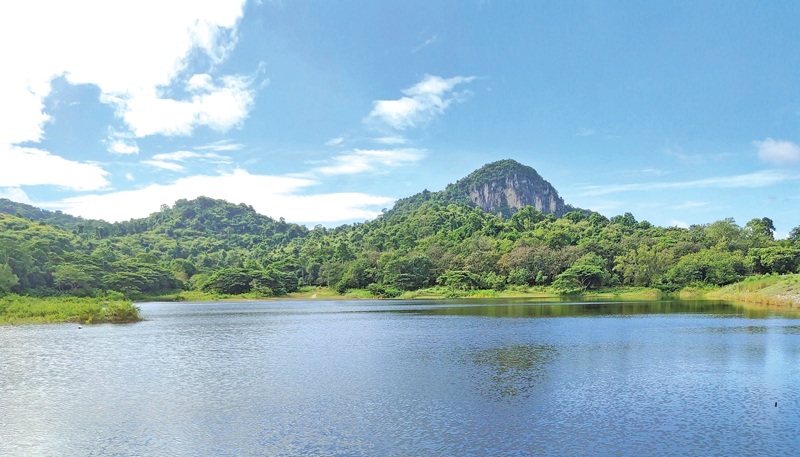Following are excerpts from an interview with Theravada Bhikkhu Ven. Ajahn Suchart Abhijato Maha Thera of Thailand. The Maha Thera is well known across the globe for his effective Dhamma teaching methods and meditation practice.
Q: Sometimes we find it difficult to lead a life fully committed to meditation as we have other obligations. How do we overcome this?
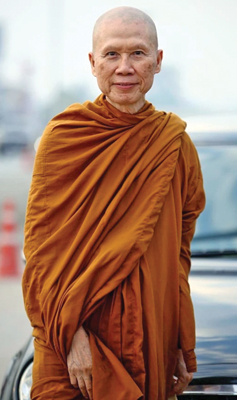
Ven. Ajahn Suchart Abhijato Maha Thera
A: You have to find the right reason to leave everything else. If you find the right reason, everything else seems insignificant.
Q: Many women I spoke to said they find it difficult to devote themselves fully to practise meditation due to their commitments to their spouse, children, or parents. That is why I raised the above question.
A: It depends on each individual I think. Each individual has different strengths and levels of wisdom,to understand that what they are experiencing right now is dukkha, not happiness. If we have the wisdom and strength to let go of the attachment to our sensual comforts, we can leave everything else easily.
Q: You mean irrespective of our gender?
A: Yes. If you still see that life is full of pleasure and happiness, then you will find it difficult to leave. But if you find it as something filled with suffering, then you definitely want to leave it as soon as possible. It is like when you find yourself inside a burning house. Then you don’t want to stay in the burning house. You want to get out as soon as possible.
Q: Queen Maha Maya, Prince Siddartha’s mother was born in Thusitha heaven after her death on the seventh day of Prince Siddartha’s birth. Where is Thusitha heaven located?
A: The mind lives in the spiritual world. It is not located in our physical world. The body exists in the physical world while the mind exists in the spiritual world. Even right now, your mind is sending signals to your body, communicating like two mobile phones.
Q: But the Buddha went to Thushita Heaven to preach the Dhamma to Queen Maha Maya, who had been reborn as a deity there, right?
A: The Buddha connected with her through his psychic power.
Q: So there is no particular location?
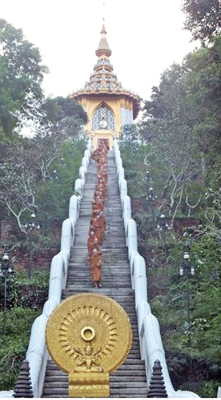 A: No. We generally say ‘in the spiritual world.’ But the spiritual world is different from our physical world where we have sizes, shapes, and forms. In the spiritual world, there is no size, shape, or form. It is like the empty sky or space.
A: No. We generally say ‘in the spiritual world.’ But the spiritual world is different from our physical world where we have sizes, shapes, and forms. In the spiritual world, there is no size, shape, or form. It is like the empty sky or space.
Q: Similarly we have read that Devadatta who tried to kill the Buddha is suffering in ‘hell’ now. Where is it located? There is no physical space for that as well?
A: Yes. These are states of mind. Different states of mind emerge from the types of your Kamma. Good Kamma creates a happy state of mind and bad Kamma creates a bad state of mind. So it is not a place, it is a state of mind. When you are sad it is as if you are in hell.
Q: So Devasatta’s suffering is mental?
A: It is like having bad dreams when you are in sleep. If it is good Kamma you have good dreams just like Prince Siddartha’s mother. She is having good dreams while Devadatta has bad dreams.
They will have these good or bad dreams until the Kamma they performed runs out of steam. Then they can return to the human world.
Q: Abstaining from alcohol is one of the Five Precepts. Some hold the view that drinking alcohol is not inherently sinful. If that’s the case, why is abstaining from alcohol included in the Five Precepts?
A: It is not a sin unless it contributes to your sinful action or pushes you to commit sinful action easily. When one gets drunk the person cannot control his thoughts, speech, and actions. So if you think negatively while drunk, you may end up speaking badly and eventually behaving badly. Therefore, it is better not to drink in order to be mindful. When you are drunk you lose your mindfulness.
Q: That is why we are being asked not to drink at all, right? Is it still bad to take even one glass of wine? Some believe that drinking a small quantity of wine is good for heart health.
A: It probably is as long as you do not do any bad action that is sinful. But the problem is when you take one drink you may want a second drink, next a third drink and it goes on. So the best advice would be to refrain from drinking altogether.
Q: So we need to disregard the notion that even a little bit of wine is beneficial for us. Correct?
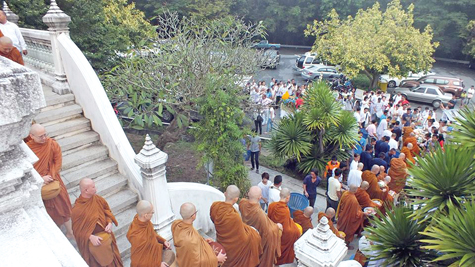 A: Can you guarantee that you only take one drink? That’s the problem. Maybe when you are more stressed, you feel one drink is not enough. Then what you do is you go for a second drink. So it is better not to play with fire at all.
A: Can you guarantee that you only take one drink? That’s the problem. Maybe when you are more stressed, you feel one drink is not enough. Then what you do is you go for a second drink. So it is better not to play with fire at all.
Q: When we undergo hardships or face difficult relationships, we attribute these experiences to our past Kamma. We believe if someone does something bad to us, it is because of the bad Kamma we had committed in the past. That means we are meant to suffer for our previous actions. My question is, if someone wrongs us as a result of our past Kamma, that person is creating new bad Kamma for himself/herself. Does this mean that for us to suffer for our past Kamma, another person is compelled to commit a bad action, for which they will later suffer?
A: Yes. That’s why the Buddha teaches us to forgive and not to take revenge on others at any cost.
Q: For us to suffer for our past Kamma, other people are drawn to commit more Kamma?
A: That is right. They are taking revenge on you and you react the same way with them again. So the Buddha said that you can stop bad Kamma from accruing only by forgiving—by completely stopping revenge.
Q: We have to be very thoughtful to avoid creating further Kamma. Is n’t that so?
A: That is right. Just accept the consequences of your bad Kamma.
If someone wants to hit you, let them do so. Once that moment is over, that person will feel happy and no longer bother you.
If you do not react, if you do not hurt them, they do not come back and bother you. But if you react and hurt them they will come back. It will continue back and forth, endlessly.
Q: Some people hold the view that Buddhism largely focuses on the negative aspects of life or Asuba. Is this correct?
A: It is just a belief, it is not true. Asuba meditation is for the purpose of getting rid of sexual desires.
Q: When we keep focusing on negative things we will attract more of it.
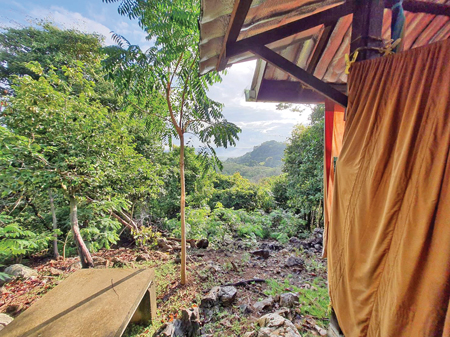 A: No. They are just medicine to cure our sicknesses – our stresses. Sometimes we have to take a bit of medicine to cure our sickness, right? Sometimes you have to go through operations /surgery to fix your sickness. So Asuba is like surgery for the mind. And for people who are not sick, they do not have to go to surgery right? Asupa is for those whose sexual desire stands as a hindrance in meditation practices. But if sexual desire is not a problem for them, then there is no need to practise Asuba. So it is only for those who are ‘sick.’
A: No. They are just medicine to cure our sicknesses – our stresses. Sometimes we have to take a bit of medicine to cure our sickness, right? Sometimes you have to go through operations /surgery to fix your sickness. So Asuba is like surgery for the mind. And for people who are not sick, they do not have to go to surgery right? Asupa is for those whose sexual desire stands as a hindrance in meditation practices. But if sexual desire is not a problem for them, then there is no need to practise Asuba. So it is only for those who are ‘sick.’
Q: Insects and worms are born in millions simply from dust. Isn’t it hard for us to believe that they might have had previous births?
A: The body comes from Four Elements. It is the same thing, no difference. The mind is only connected to the body. The mind is not inside the body. The mind is like a telephone connecting to another telephone which is the body. And it is the radio frequency/radio wave to communicate with each other.
Q: A human too can be born as a tiny creature – worm, insect or so. Am I correct?
A: Yes. If someone accumulates a lot of bad Kamma during their human life that is possible.
Q: What is the best way to cultivate compassion (Karuna) and loving-kindness (Metta) in our interaction with others ?
A: You have to practise loving-kindness always. When you see somebody say ‘hello’ and smile at the person to make them happy. If someone needs help, and if you’re able to lend a hand to someone in need, please do so. But if you are not in a position to help, do not feel bad about it, just practise equanimity. You just have to say “Sorry, there is nothing I can do for you” and refrain from feeling bad or sad about it, as you’re genuinely unable to assist.
– Ven. Ajahn Suchart Abhijato Maha Thera was born on November 2, 1947. Having completed his degree in Civil Engineering at California State University, Fresno, USA, he returned to his motherland where he designed an ice cream parlour for a brief stint.
Quite soon, inspired by a Dhamma book, he decided to go in search of “true happiness,” to find inner peace through the practice of Buddhist meditation. He became a bhikkhu at the age of 27 and received ordination at Wat Bovornives in Bangkok on February 19, 1975, with Somdet Phra Ñanasarivara, the late Supreme Patriarch (Somdet Phra Sangharaja), as his Preceptor.
Ven. Ajahn Suchart Abhijato Maha Thera resides in Wat Yansangwararam, Thailand.







